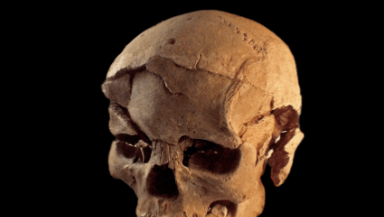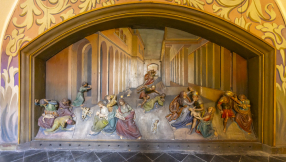
A bloodthirsty massacre of 27 people... When my radio woke me up this morning, I feared the worst. Where had this terrible crime occurred? Soon enough I realised I could calm down. It had happened ten thousand years ago. The reason the news programme was discussing the event was the bodies had just been uncovered and analysed.
A team of scientists from Cambridge University had been looking at the bones which were discovered in Kenya. Their conclusions were fascinating.
One of the team remarked that, "These human remains record the intentional killing of a small band of foragers with no deliberate burial, and provide unique evidence that warfare was part of the repertoire of inter-group relations among some prehistoric hunter-gatherers."
As the conversation on the radio developed, it became obvious that the researchers had been surprised to find such evidence of brutal violence. It seems there had been a working presumption that 'warfare' or organised slaughter of this kind had only happened after the development of agrarian societies – in other words, war only began when there was territory or produce worth capturing.
But we now seem to have evidence that even before there was a 'reason' for such violence, it existed.
Frankly, I'm astonished that anybody's surprised by this. The Christian worldview tells us that violence is sadly an inherent part of our condition as fallen humans. Because of our propensity to sin, violence will periodically erupt. Whether its causes are in some sense understandable or justified is a secondary issue.
Looking at one of the first recorded sins in the Bible, it's clear that Cain's response to Abel's sacrifice being found acceptable to God was a murderous one. The former Chief Rabbi, Lord Sacks, suggests that envy of others' possessions can play a big role in encouraging violence. "If we read the Book of Genesis carefully, we see that the great threat to humanity is sibling rivalry and what René Girard calls 'mimesis, the desire to have what your brother has rather than rest content with your own," he says. If this is true, this instinct would have been present for as long as humans have been humans, rather than being prompted by the rise of agriculture.
Human sinfulness – in this case envy and violence – is intrinsic to all societies in all times. That's why, even in societies which are equal, just, wealthy and relatively peaceful, we see outbursts of violence. Our propensity to sin tips over into evil acts.
Another article ruminating on evil has something to say about this. Lloyd Strickland examines different philosophers' approaches to the subject. His starting point is the Vatican newspaper's suggestion that the characters in the new Star Wars film aren't malevolent enough, and takes us on a brief tour of how Socrates, Leibniz and Hannah Arendt have each dealt with the existence of evil.

It's a good read and draws out some of the differing ways in which evil has been thought of throughout the last few millennia.
His conclusion leaves a little to be desired, though. "The Vatican might (understandably) like its villains to be truly devilish in nature," he argues, "but in reality, most bad guys tend to be those who do not think clearly, or who just do not think at all."
This seems a bit naïve. In placing the responsibility for evil on defective thinking, we find ourselves in a very modern dilemma. It suggests that steering clear of evil can be taught or learned.
It also seems to imply that we should be able to think our way out of evil as a society – that with enough education and effort we can prevent evil from happening. The Christian worldview says this just isn't possible. Evil exists because of sin and ultimately because of the Devil. So rather than learning, teaching or even evolving our way away from it, we need forgiveness.
The forgiveness offered by Jesus isn't about avoiding the reality of evil or indeed about pretending it will never happen. It's about acknowledging that it does happen – and we have played a part in it. But then it moves us through sanctification. This means as we are "conformed to the image of the Son" we became less entranced by evil and more prone to doing good – while still acknowledging that we'll fail from time to time.
















